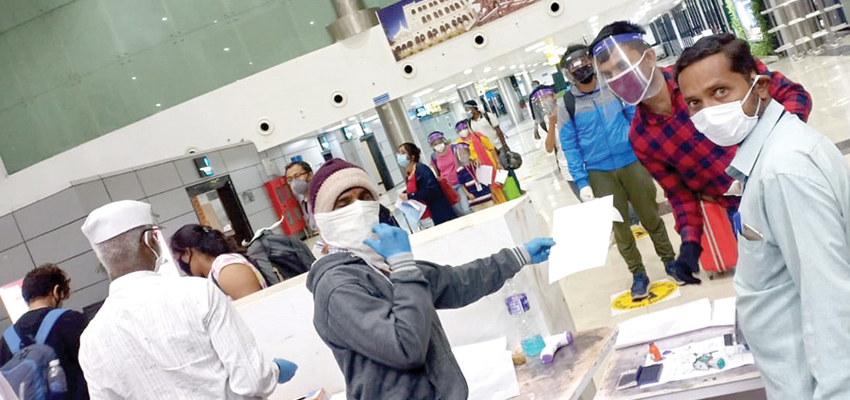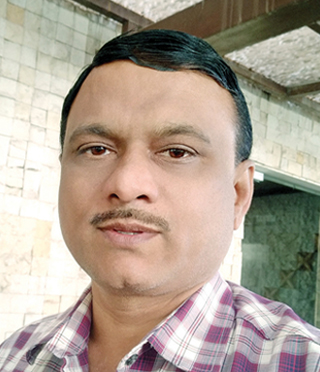Ensuring Safe Ground

In his additional role as the Pune Municipal Corporation’s Airport teams’ Chief Nodal Officer, noted officer Ashok Digambar Ghorpade (also the chief garden superintendent for the PMC) works around the clock along with his team to ensure the health and well-being of incoming passengers through meticulous planning, data collection and stringent security checks
If God lies in the details, so does professionalism.
When air travel was restarted in late May 2020, two months after it was stopped as part of the government measures to control the spread of the COVID-19 pandemic, the Pune Municipal Corporation’s Airport team was entrusted with a key responsibility: to screen each and every incoming passenger for potential symptoms, to collect pertinent data with regard to their travel details and duration of stay in the city and stamp their left knuckle with the all-important 14-day ‘Home Quarantine’.
A job that the Chief Nodal Officer Ashok Ghorpade has taken up with dedication and painstaking attention to detail. “As per the May 25 order of Mrs Rubal Agarwal, Additional Municipal Commissioner, I was required to implement stringent and foolproof security and passenger tracking measures at the Lohegaon Airport,” he shares. This included both domestic passengers returning home after months of being stranded in different cities as well as the international passengers who were flown home under the aegis of the Vande Bharat mission. “It helped that a standard operating procedure had been duly prescribed,” he says. “Our role was to make sure it was faithfully implemented.”
No easy task given that it was an unprecedented situation: monitoring the health status and movement of whoever flies into Pune, an important educational and business hub, along with its current unfortunate status of being a COVID-19 hotspot.
Getting down to brass tacks
To begin with, Ghorpade and his team had a meeting with the Airport Terminal Manager asking for a safe designated space from which to operate. “A desk with an acrylic wall and appropriate seating was duly ear-marked near the arrival gates. This would ensure the screening staff’s safety as well. The airport is operational 24x7 and as many as 25 to 30 flights land in Pune each day, bringing in passenger traffic to the tune of 2500 to 3000 heads daily,” he shares.
His team’s role includes getting a detailed self-declaration form signed from each passenger with details such as potential symptoms, travel history, intended duration of stay in the city, work and address in the city, mobile number as well as the airline that they have flown on, along with day, date and time. “This is then handed over to the clerk at the counter who checks for each detail being filled in properly, along with the signature of the passenger. After this, the passengers are stamped with “Home Quarantine” on the left knuckle. Of course, the Home Quarantine does not apply to some including senior citizens, pregnant ladies and others who would require to travel in and around the city for medical assistance. Similarly, those passengers with a return ticket cannot be grounded at their place of stay. They usually have work to accomplish and a definite plan to go back to their home town,” explains Ghorpade.
After a thermal screening from security as well as double check for the Home Quarantine stamp, the passengers are allowed to exit.
So diligently is this followed that the staff did not even spare Additional Commissioner Shantanu Goyal due process on his return from a visit to his home town for a family emergency. “He was politely but firmly told that he would have to have the stamp on his left hand as they had not received any intimation of his imminent arrival,” smiles Ghorpade. “He had to call me up to ‘rescue’ him as officers and those engaged in essential services are exempted from quarantine with good reason. How else will they get back on duty?”
However, the honesty and due diligence exhibited by the staff pleased Goyal immensely and he congratulated Ghorpade and team on a job well done. “He even rang up the press to tell them how well the team was working,” says Ghorpade.
The data is collected every twelve hours and is shared with the PMC’s disaster cell who then follow up through calls to the passengers to check on their health and direct them to the nearest suitable hospital or clinic in case of symptoms of coronavirus. “Each and every passenger counts. No one should slip in between the cracks because of the highly infectious nature of the virus and the fact that even carrier can spread it far and wide,” he says. In other words, carelessness is not an option.
“The opportunities for growth in a crisis are immense. It’s up to you to keep your mind open. This is not the time to complain or nitpick”
- Ashok Digambar Ghorpade
 Ashok Digambar Ghorpade
Ashok Digambar GhorpadeRound the clock and beyond
Even as he carries out his current role at the airport, there’s no forgetting his original role as the Chief Garden Superintendent for the PMC. To this end, he shuttles between his office and the airport. Luckily, his home is not far from the airport. “In short, there are no holidays for me,” he exhales. “But my staff has to have a weekly off in order to recoup,” he says.
From making sure that they don’t run short of security gear like masks, gloves and PPE kits or administrative basics like stamps, Ashok Ghorpade is working all hours of the day. “It is also mandatory for my team to undergo regular screenings for the virus. They are exposed to a lot and their risk potential is high. A doctor’s team visited them recently. Despite our best precautionary measures, two members of our team tested positive for coronavirus symptoms and have been prescribed due isolation and rest,” he says.
Similarly, a WhatsApp team that includes him and his staff facilitate due support to any employee who may need it. “Just recently, a member of my garden staff had to be rushed to the hospital due to oxygen shortage. Since all the hospital beds are currently occupied and most health care centres groaning under the weight of so many patients, it was quite the task to find him a bed. Had we not succeeded, he would have died,” he says.
Naturally, the learnings at this difficult time have been vast and varied. “If you can be of service to your community in moments of emergency, consider yourself blessed,” he says. “The virus has shown that it does not discriminate between rich and poor. It does not care about what community or country you belong. In a way, it has been the proverbial leveller,” he muses. “What does count is man’s innate ability to overcome and extend a helping hand to others. Tough times also have a way of bringing out the finest in the human spirit,” he points out.
Given the pressures of being on-call round the clock, how does he unwind? “I meditate for an hour every morning. This helps me stay calm and focused, even as it brings perspective to recent happenings at work,” he expresses.
“The opportunities for growth in a crisis are immense. It’s up to you to keep your mind open. This is not the time to complain or nitpick. One must give the task on hand everything one has.”
In this, he is lovingly supported by his wife and two children Akshada (22) and Harshal (16.) “My family is my mainstay and gives me all the positivity and energy I need to return to work refreshed and recharged,” he rounds off.